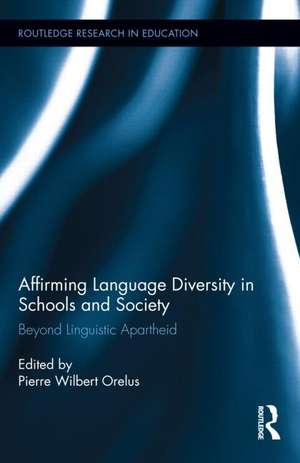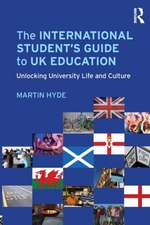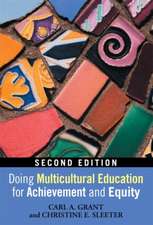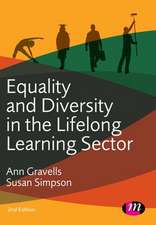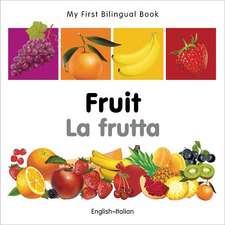Affirming Language Diversity in Schools and Society: Beyond Linguistic Apartheid: Routledge Research in Education
Editat de Pierre Orelusen Limba Engleză Hardback – 13 ian 2014
Contributors to this volume provide a historical overview of the way many languages labeled as inferior, minority, or simply savage have been attacked and pushed to the margins, discriminating against and attempting to silence the voice of those who spoke and continue to speak these languages. Further, they demonstrate the way and the extent to which such actions have affected the cultural life, learning process, identity, and the subjective and material conditions of linguistically and historically marginalized groups, including students.
| Toate formatele și edițiile | Preț | Express |
|---|---|---|
| Paperback (1) | 375.13 lei 6-8 săpt. | |
| Taylor & Francis – 18 noi 2016 | 375.13 lei 6-8 săpt. | |
| Hardback (1) | 1228.07 lei 6-8 săpt. | |
| Taylor & Francis – 13 ian 2014 | 1228.07 lei 6-8 săpt. |
Din seria Routledge Research in Education
-
 Preț: 302.68 lei
Preț: 302.68 lei - 9%
 Preț: 935.34 lei
Preț: 935.34 lei -
 Preț: 304.16 lei
Preț: 304.16 lei -
 Preț: 290.72 lei
Preț: 290.72 lei -
 Preț: 303.87 lei
Preț: 303.87 lei -
 Preț: 303.11 lei
Preț: 303.11 lei -
 Preț: 310.29 lei
Preț: 310.29 lei -
 Preț: 304.82 lei
Preț: 304.82 lei -
 Preț: 276.13 lei
Preț: 276.13 lei -
 Preț: 303.87 lei
Preț: 303.87 lei -
 Preț: 310.31 lei
Preț: 310.31 lei -
 Preț: 377.83 lei
Preț: 377.83 lei - 8%
 Preț: 381.60 lei
Preț: 381.60 lei -
 Preț: 310.65 lei
Preț: 310.65 lei - 8%
 Preț: 381.99 lei
Preț: 381.99 lei -
 Preț: 303.87 lei
Preț: 303.87 lei -
 Preț: 303.74 lei
Preț: 303.74 lei -
 Preț: 147.15 lei
Preț: 147.15 lei -
 Preț: 401.00 lei
Preț: 401.00 lei - 9%
 Preț: 867.49 lei
Preț: 867.49 lei -
 Preț: 129.91 lei
Preț: 129.91 lei - 5%
 Preț: 140.52 lei
Preț: 140.52 lei -
 Preț: 310.08 lei
Preț: 310.08 lei -
 Preț: 364.04 lei
Preț: 364.04 lei -
 Preț: 280.61 lei
Preț: 280.61 lei -
 Preț: 351.06 lei
Preț: 351.06 lei -
 Preț: 400.71 lei
Preț: 400.71 lei - 18%
 Preț: 1116.74 lei
Preț: 1116.74 lei - 18%
 Preț: 1060.52 lei
Preț: 1060.52 lei -
 Preț: 397.75 lei
Preț: 397.75 lei - 18%
 Preț: 1221.80 lei
Preț: 1221.80 lei - 18%
 Preț: 1110.74 lei
Preț: 1110.74 lei - 18%
 Preț: 1053.92 lei
Preț: 1053.92 lei - 18%
 Preț: 1162.84 lei
Preț: 1162.84 lei - 18%
 Preț: 1063.65 lei
Preț: 1063.65 lei - 25%
 Preț: 851.82 lei
Preț: 851.82 lei - 18%
 Preț: 1062.62 lei
Preț: 1062.62 lei - 18%
 Preț: 1058.10 lei
Preț: 1058.10 lei - 18%
 Preț: 1178.85 lei
Preț: 1178.85 lei - 18%
 Preț: 1112.21 lei
Preț: 1112.21 lei - 18%
 Preț: 1057.75 lei
Preț: 1057.75 lei -
 Preț: 489.03 lei
Preț: 489.03 lei - 18%
 Preț: 1059.14 lei
Preț: 1059.14 lei - 18%
 Preț: 1050.09 lei
Preț: 1050.09 lei - 18%
 Preț: 1060.52 lei
Preț: 1060.52 lei - 18%
 Preț: 1062.98 lei
Preț: 1062.98 lei - 18%
 Preț: 1056.28 lei
Preț: 1056.28 lei - 18%
 Preț: 1217.63 lei
Preț: 1217.63 lei - 18%
 Preț: 1060.19 lei
Preț: 1060.19 lei
Preț: 1228.07 lei
Preț vechi: 1497.65 lei
-18% Nou
Puncte Express: 1842
Preț estimativ în valută:
235.03€ • 243.50$ • 196.14£
235.03€ • 243.50$ • 196.14£
Carte tipărită la comandă
Livrare economică 21 martie-04 aprilie
Preluare comenzi: 021 569.72.76
Specificații
ISBN-13: 9780415824828
ISBN-10: 0415824826
Pagini: 312
Ilustrații: 3
Dimensiuni: 152 x 229 x 23 mm
Greutate: 0.74 kg
Ediția:New.
Editura: Taylor & Francis
Colecția Routledge
Seria Routledge Research in Education
Locul publicării:Oxford, United Kingdom
ISBN-10: 0415824826
Pagini: 312
Ilustrații: 3
Dimensiuni: 152 x 229 x 23 mm
Greutate: 0.74 kg
Ediția:New.
Editura: Taylor & Francis
Colecția Routledge
Seria Routledge Research in Education
Locul publicării:Oxford, United Kingdom
Public țintă
Postgraduate and UndergraduateCuprins
Foreword Sonia Nieto 1. Introduction: Linguistic Apartheid No Más: Honoring all Languages Pierre Wilbert Orelus Part I. Linguistic Apartheid in the United States: From the Colonial to the Neocolonial Era 2. 21st Century Linguistic Apartheid: English Language Learners in Arizona Public Schools Mary Carol Combs, Ana Christina da Silva Iddings, and Luis Moll 3. Cultural Hegemony, Language, and the Politics of Forgetting: Interrogating Restrictive Language Policies Antonia Darder 4. Reclaiming the Taino Legacy: Issues of Language, Culture, and Identity Lourdes Diaz Soto & Simone Tuinhof de Moed 5. Overcoming Linguistic Apartheid: Contesting the Raj’s Divide and Rule Policies Vaidehi Ramanathan Part II. Beyond Draconian Language Policies: Affirming Language Diversity 6. Human Right, States’ Rights, and Linguistic Apartheid Peter McLaren and Arturo Rodriguez 7. Bite Your Tongue: How the English-Only Movement Has Silenced Voices of Dissent Pepi Leistyna 8. Colonial Education in the Southwest: White Supremacy, Cultural and Linguistic Subtraction, and the Struggle for Raza Studies José García, Eric Bybee, and Luis Urrieta Jr. 9. (Dis) appearance of Deficit: How Teachers Struggle to Serve Multilingual Students under "English Only" Theresa Austin, Stephanie Rondeau and Kim Stillwell Part III. In Defense of Language Rights of Minorities: Beyond English Hegemony 10. Language Rights for Social Justice: The Case of Immigrant Ethnolinguistic Minorities and Public Education in the United States Laura Valdiviezo, Margaret Felis, Amy Lenard, and Sandy Browne 11. Textbooks for English Academic Purposes: Are They a Trojan Horse Bearing the Advance Forces of Linguistic Domination? Indika Liyanage and Tony Walker 12. Beyond Absurdity: Working Past the Repression of Dialogue in U.S. Schools Bob Fecho 13. Americanisation and Englishisation as Processes of Global Occupation Robert Phillipson 14. The Role of Mother Tongues in the Education of Indigenous, Tribal, Minority and Minoritized Children – What Can Be Done to Avoid Crimes Against Humanity? Tove Skutnabb-Kangas 15. The Colonialism of English- Only Donaldo Macedo 16. Affirming Bilingualism and Bi-literacy: In Defiance of English-only Laws Pierre Wilbert Orelus Contributors
Notă biografică
Pierre W. Orelus is assistant professor at New Mexico State University. His research interests include language, race, and gender studies; post-colonial, transnational, and immigrant studies; and critical pedagogy. His recent books include Whitecentricism and Linguoracism Exposed, The Race Talk, and Radical Voices for Democratic Schooling with Curry Malott.
Recenzii
'Much has been written about language loss and of restrictive language policies in the United States, but what makes this book important is its broad sociocultural lens rooted in a postcolonial perspective, as well as the analysis of local US cases within a global framework of English hegemony. Bringing together critical scholars from around the world, the book offers a unique study of the historical and economic roots of English only policies in the United States and its effects on the material conditions of minoritized populations.' - Ofelia García, City University of New York, USA
Descriere
This edited volume will explore linguistic apartheid, or the disappearance of certain languages through cultural genocide by dominant European colonizers and American neoconservative groups. It will trace back this form of apartheid from the colonial era to the English-only movement in the United States. Contributors demonstrate the way and extent to which such actions have affected the cultural life, learning process, identity, and the subjective and material conditions of linguistically and historically marginalized groups, including students. Further, they propose alternative ways to counter linguistic apartheid that minority groups and students have faced in schools and society at large.
